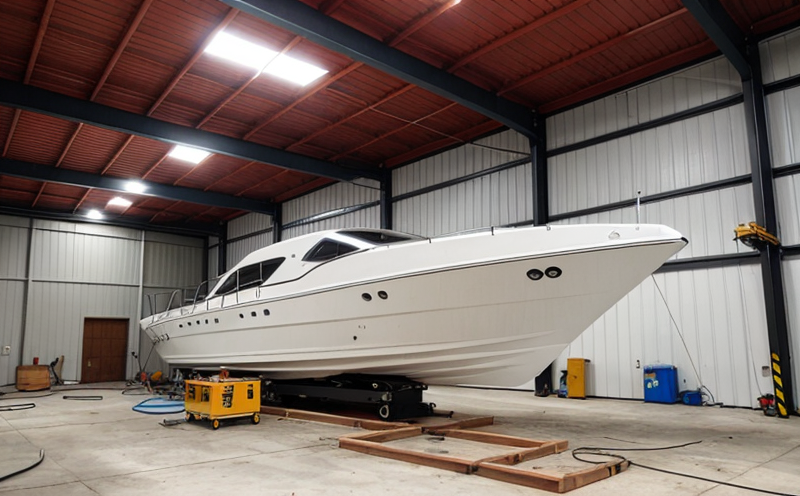ISO 12215 Structural Testing of Small Craft Hulls
The ISO 12215-1 standard provides a comprehensive approach to evaluating structural integrity in small craft hulls. This test is essential for ensuring that marine and ship equipment, particularly small boats and recreational vessels, can withstand the harsh conditions they encounter during operation.
Structural testing under ISO 12215 involves several stages designed to simulate real-world stresses experienced by a vessel's hull. These tests are critical in confirming that the materials used in construction meet durability and safety standards set forth by international regulations.
The process begins with the selection of appropriate specimens, which must be representative of the actual structure being tested. This includes careful preparation to ensure the integrity of the sample before testing commences. The test conditions replicate environmental factors such as saltwater immersion, temperature changes, and mechanical stresses from various loading scenarios.
During the testing process, sophisticated instrumentation is employed to measure strain, deflection, and other key parameters that indicate structural performance under load. This data is collected and analyzed using advanced software tools, providing detailed insights into any weaknesses or areas requiring improvement.
The results of these tests are crucial for quality assurance and compliance with international standards like ISO 12215-1. They help manufacturers ensure their products meet the highest safety and performance benchmarks, thereby protecting both operators and passengers from potential hazards.
- Comprehensive evaluation of structural integrity
- Simulation of real-world environmental conditions
- Sophisticated instrumentation for precise measurement
- Data analysis software for detailed insights
- Ensures compliance with international standards
The importance of this test cannot be overstated, especially in the context of marine and ship equipment. By adhering to these rigorous testing protocols, manufacturers can enhance product reliability and safety, ultimately contributing to a safer maritime industry.
In summary, ISO 12215-1 structural testing is an indispensable tool for ensuring that small craft hulls are built to withstand the rigors of marine environments. This standard provides a robust framework for evaluating structural integrity, which is vital for maintaining safety and compliance with international regulations.
Eurolab Advantages
At Eurolab, we pride ourselves on offering unparalleled expertise in marine and ship equipment testing. Our state-of-the-art facilities are equipped with the latest technology to provide accurate and reliable test results that meet international standards. Here’s why choosing us for your ISO 12215-1 structural testing needs is advantageous:
- Accurate Instrumentation: We use cutting-edge instrumentation designed specifically for marine applications, ensuring precise measurements.
- Experienced Staff: Our team comprises highly skilled engineers and technicians with extensive experience in marine equipment testing.
- Comprehensive Testing Capabilities: From specimen preparation to post-test analysis, we offer a full range of services tailored to your specific requirements.
- ISO Compliance: All our tests are conducted according to international standards, guaranteeing the highest level of accuracy and reliability.
- Sustainable Solutions: We focus on sustainable practices throughout our testing processes, minimizing environmental impact while maintaining efficiency.
- Customized Services: Whether you need general compliance testing or specialized evaluations, we can provide customized solutions to meet your unique needs.
- Fast Turnaround Times
Why Choose This Test
- To ensure that small craft hulls comply with international standards for structural integrity
- To enhance product reliability and safety, reducing the risk of accidents or failures at sea
- To provide detailed data on the performance of materials under simulated real-world conditions
- To meet regulatory requirements and maintain compliance with maritime industry standards
- To identify potential weaknesses in design or construction that may need improvement
- To validate the effectiveness of new materials or construction techniques before full-scale production
- To improve overall product performance and extend the lifespan of marine equipment
- To ensure customer satisfaction by delivering products that meet high safety standards
By choosing ISO 12215-1 structural testing, you are investing in the future safety and reliability of your small craft hulls. This test not only provides a clear picture of current performance but also helps guide future improvements in design and construction.
Quality and Reliability Assurance
The ISO 12215-1 structural testing process is designed to ensure that small craft hulls meet stringent quality and reliability standards. This involves a series of rigorous tests aimed at identifying any potential weaknesses or areas for improvement in the design and construction of these vessels.
One of the key aspects of this test is specimen preparation, which requires careful selection and handling to preserve the integrity of the sample throughout the testing process. Once prepared, specimens undergo a range of mechanical and environmental stress tests that simulate real-world conditions they are likely to encounter during operation.
The use of advanced instrumentation allows for precise measurement of strain, deflection, and other critical parameters during these tests. This data is then analyzed using sophisticated software tools, providing detailed insights into the structural performance of each specimen. Any deviations from expected results can be identified early on, allowing for targeted improvements in design or construction.
Compliance with international standards such as ISO 12215-1 ensures that all tests are conducted to a high level of accuracy and reliability. This not only helps maintain consistency across different batches of products but also builds trust among customers who rely on these vessels for safe transportation at sea.
In addition to ensuring compliance with international standards, this testing process plays a crucial role in enhancing overall product performance and extending the lifespan of marine equipment. By identifying potential issues early on through comprehensive evaluation, manufacturers can make informed decisions about necessary changes or enhancements before full-scale production begins.





